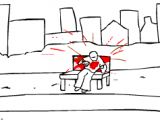In our world we and everybody else have more and more options and this makes it more and more difficult to predict what's going to happen. Everybody's actions seem much more irregular and the potential for surprise is much higher today than it ever was. This makes many people feel they lack the proper adaptation to the world around them. A highly unpredictable world is also a potential threatening world and it's a world where you don't "fit in".
This is a rather paradoxical result of civilization. The progress was defined for a long time as a continuous change of the natural environment for the purpose of making us feeling better. It was said: animals adapt to their surroundings, while humans adapt the surroundings to themselves.
And this has indeed happened. Our conquest of the Earth is almost total, at least when it comes to land. The recent discovery of a previously untouched part of New Guinea has made headlines all over the globe. It is indeed an astonishing story. Who would have thought there still was a 'lost' world somewhere in our world? The sensational nature of such a story shows how total is our conquest of the Earth.
We have changed the environment so it would serve our goals, so it wouldn't be so unpredictable by itself, outside of our control. But as we had conquered and changed the world a paradox was generated: we are by far the most unpredictable part of nature. As we have succeeded turning the world into our own image, as we have succeeded rebuilding it almost from scratch (think about how "natural" are our gardens at the 25th floor of a skyscraper, or how "natural" is our food - and I'm not talking only about the GM food), what has been a technical problem for the scientists and engineers (the "conquer the world" task) has now turned into a political problem and into a psychological problem.
The issue in no longer to conquer nature, it is to conquer our nature and to make your goals matter more than other people's goals when they are in conflict.
The psychology of boredom
In The French Lieutenant's Woman, John Fowles describes the 19th century as the century of boredom (at least for the aristocrats). He says at a certain point that people in the 19th century were as hung as we are a bunch of neuropaths.
But boredom is again in fashion. However, if 19th century aristocrats were bored because they had nothing much to do, people today are bored because they have so many things to do that all of them seem pointless. This is another paradox generated by our progress. How can one feel bored when there are so many things that could be done? In our days the boredom has moved on a higher level: it's the lack of any decision criterion that's bothering people. The 19th century people lacked things to do; the 21st century people lack criteria for what to do.
You could do so many things, you could have fun in so many ways, you could travel in so many places etc. But why should you choose one thing over the other? This is probably the most ridiculous problem ever faced by humanity. How could you not know what you yourself want?! If you don't, who could?
There are so many things I could write on this subject, but why should I choose one over the other? The writer's block has evolved as well, you see.
For instance, I could tell you about a new study that shows we make our music purchases based mostly on our perceived preferences of others. "People are faced with too many options, in this case [in their experiment] 48 songs. Since you can't listen to all of them, a natural shortcut is to listen to what other people are listening to," explains Matthew Salganik, a sociologist at Columbia University. And this is funny, because everybody is doing the same thing.
Or I could tell you about the rise in ethnic sense. Why are people proud of belonging to a certain ethnic group, and why do they care so much about their traditions? You don't struggle to achieve a certain ethnicity, you are born with it. So, how can one be proud for something one has no merit whatsoever?! Or how could one say something like "I'm proud to be a woman"?! To me, this sounds very funny, but the reason why people are saying such things is more serious. It's because they don't know what to choose and then they decide to simply fall back on their so-called inborn "qualities". They lack any rational criterion of choosing one of the many models of living available in our society and thus they just turn to their grand-parents model of living.
I could tell you about so many other things but I'm also bored...
Adaptation and creativity
The paradoxical aspect of our world is that it is supposed to be totally adapted to out desires and needs but in the same time the feeling of maladjustment is rampant. Even people who turn to their ethnicity for comfort are doing it from an initial sentiment of maladjustment to the actual, highly diverse world of today.
But the lack of adaptation can also be used in a creative manner. In the end, it was the lack of adaptation of our early ancestors to the "natural" environment that made them create the civilization and it was precisely this sentiment that created progress. But as the sentiment of boredom has suffered a revolution, so is the idea of progress.
Maladjustment is not necessarily something bad - on the contrary, it is the seed of change and creativity. We create things that make us feel better, i.e. we enrich our environment so we can feel less maladjusted. But as we came to dominate and rebuild the Earth entirely, our environment is now made up only of other people and their creations. And thus, the target of creativity is now entirely social.
This is how the psychology of boredom and maladjustment unavoidably leads to politics.
The politics of toleration
In my view there are only two basic options here. One is resentment towards the social complexity of our world which can lead either to the nihilism of depression or of "carpe diem" hedonism, or to the espousal of ethnicity and of nostalgia for the traditions of past, simpler, times. The nihilist simply decides to abandon his or her free will and the very idea of having values and criteria for choices, and decides to act at random. The book The Dice Man by Luke Rhinehart is a great example of such a life style. The Buddhist religion is a great example of the attempt to justify nihilism. On the other hand, the Islamic terrorists are a great example of how to embrace nostalgia all the way.
The other option is to embrace the social diversity of our society and to choose tolerance, but not in a hippy-politically-correct nonsensical way. This doesn't mean you have to accept or pretend you like every crap you see, simply because "you embrace diversity". That's just plain nihilism. Sometimes it's ok to "hate every mothefucker that's in your way" as a famous songs advices. Tolerance doesn't mean to let others stump on you or to turn the other cheek; it means to allow others be in any way they desire as long as this doesn't affect you in any negative way. Tolerance means to get rid of the belief in an absolute system of values that are supposed to hold for everybody in any place at any time. It means to stop being bothered by the fact that somebody else simply is doing things differently than you.
The point is to develop a sense of inner self that has the ability of choosing and of deciding, an inner self that can create new values as they are needed. We are taught that we all have an innate soul or spirit. Well, I have news for you: we don't. It may sound paradoxical, but you are your own creation and you have full responsibility for what you become. We all play various roles in the various contexts of everyday life - but there's nobody beneath those roles except it is created. It's your choice to remain just a set of uncorrelated social roles, or to build somebody beneath them.
I think that in the end this is the only way one can live in our complex world in a creative manner and without simply being absorbed by randomness. And I also think that these are the people who can stimulate the progress of our world so it won't disintegrate (because the very preservation of our world needs constant innovation - fossil fuels get consumed and new ones are needed and so on and so on). So, will you be one of us?
Image credits: John Overmyer; Regret

 14 DAY TRIAL //
14 DAY TRIAL // 

